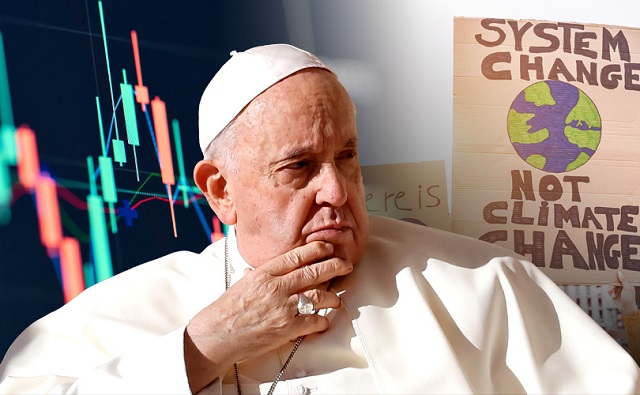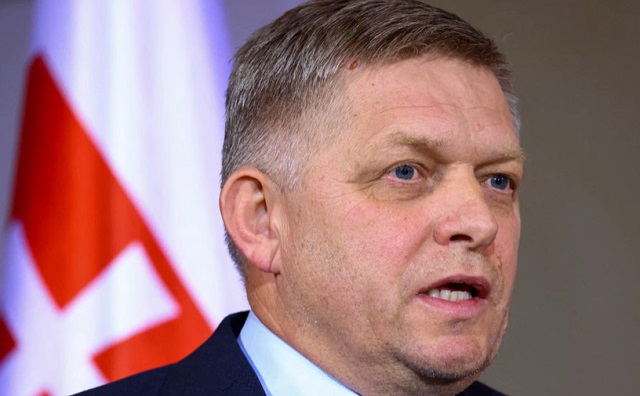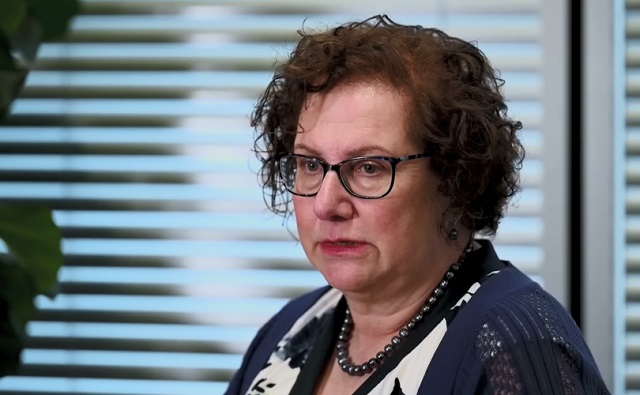By Michael Haynes, Snr. Vatican Correspondent
Pope Francis called for a ‘new global financial charter’ by 2025 which would be centered on climate change and ‘ecological debt’ in a keynote address at the Vatican-organized ‘Climate Crisis to Climate Resilience’ conference.
Addressing a Vatican-hosted climate change conference, Pope Francis called for a “new global financial charter” by 2025 which would be centered on climate change and “ecological debt.”
“There is a need to develop a new financial architecture capable of responding to the demands of the Global South and of the island states that have been seriously affected by climate catastrophes,” said Pope Francis on Thursday, May 16.
The Pontiff’s words came towards the end of his keynote address at the conference “Climate Crisis to Climate Resilience,” organized jointly by the Vatican’s Pontifical Academy of Sciences and Pontifical Academy of Social Sciences.
Outlining a three-fold action plan to respond to the “planetary crisis,” Francis told the participants that any such action must be centered around financial action.
“The restructuring and reduction of debt, together with the development of a new global financial charter by 2025, acknowledging a sort of ecological debt – we must work on this term: ecological debt – can be of great assistance in mitigating climate changes,” he said, appearing to allude to an already existing, but as yet unpublished, charter.
The Pope’s three-fold plan also highlighted his call for “policy changes” based on climate adherence and the reduction of warming, fossil fuel reliance, and carbon dioxide:
First, a universal approach and swift and decisive action is needed, capable of producing policy changes and decisions. Second, we need to reverse the curve of warming, seeking to halve the rate of warming in the short space of a quarter of a century. At the same time, we need to aim for global de-carbonization, eliminating the dependence on fossil fuels.
Third, large quantities of carbon dioxide must be removed from the atmosphere through environmental management spanning several generations.
Francis’ call for finance-related policies to implement climate change goals will have been met especially warmly by certain attendees of the Vatican’s conference. Among the numerous participants and speakers at the three-day event were ardent pro-climate change advocates California Gov. Gavin Newsom, London’s Mayor Sadiq Khan, New York Gov. Kathy Hochul, Massachusetts’s lesbian Gov. Maura Healey, along with academics and politicians from South America, Africa, Italy, and Taiwan.
Newsom and Khan – both of whom have implemented sweeping and highly controversial measures in the name of climate change – spoke respectively on “The Gold Standard – Climate Leadership in the Golden State” and “Governance in the Age of Climate Change.” Khan also wrote in the U.K.’s The Tablet that he joins his voice to that of Francis “to support climate resilience efforts and advocate for climate justice.”
Green finance for the future
While no further details were given about the charter Pope Francis referred to, in recent years increased attention has been paid to coordinating climate policies with finance, performing “debt for nature swaps” in line with the World Economic Forum’s policies, and addressing “ecological debt” itself, which is a term itself employed regularly by Francis.
Last October 4, Francis published a second part to his 2015 environmental encyclical letter Laudato Si’ in the form of the Apostolic Exhortation Laudate Deum, in which he issued stark calls for “obligatory” measures across the globe to address the issue of “climate change.”
READ: Pope Francis calls for obligatory global ‘climate change’ policies in new document ‘Laudate Deum’
“It is no longer possible to doubt the human – ‘anthropic’ – origin of climate change,” wrote the Pontiff, before later calling for mandatory alignment with “green” policies:
If there is sincere interest in making COP28 a historic event that honors and ennobles us as human beings, then one can only hope for binding forms of energy transition that meet three conditions: that they be efficient, obligatory and readily monitored.
Francis’ oft-repeated lines on the subject have repeatedly born similarities to the sentiments expressed by key globalist and founder of the World Economic Forum (WEF) Klaus Schwab, whose proposed anti-Catholic “Great Reset” is underpinned by a focus on a “green” financial agenda, as he mentions the “withdrawal of fossil-fuel subsidies” and a new financial system based on “investments” which advance “equality and sustainability” and the building of a “‘green’ urban infrastructure.”
Indeed, the world of finance is one of the sectors that is most devoted to implementing “climate change” policies, such as those outlined by the Paris Agreement – the pro-abortion climate agreement to which the Vatican joined in 2022.
A lesser-known third aim of the Paris Agreement pertains directly to the financial element of the document, ensuring that the future of global finance is directly connected to the various climate change efforts laid out in the Paris Agreement. It reads:
Making finance flows consistent with a pathway towards low greenhouse gas emissions and climate-resilient development.
This aim provides the basis for international governments to link provision of finance to the implementation of the “green” agenda of the Paris Agreement. The almost unknown Network of Central Banks and Supervisors for Greening the Financial System (NGFS) was born at the Paris “One Planet Summit” in December 2017, with the purpose of transforming the global economy in alignment with “green” climate change policies.
READ: Secretive international banking group may enforce Great Reset ‘green’ agenda on world
Already, it numbers 138 members, with an additional 21 observer organizations, including national and international banks such as the “Bank of Canada; Bank of England; Banque de France; Dubai Financial Services Authority; European Central Bank; Japan FSA; People’s Bank of China; Swiss National Bank; U.S. Federal Reserve.”
Such policies are regularly at the forefront of international finance meetings as well. One such example was last year, when French President Emmanuel Macron called for a “public finance shock” based around climate issues and global finance. His address was given to international leaders at the 2023 Summit for a New Global Financial Pact, held in Paris.

















